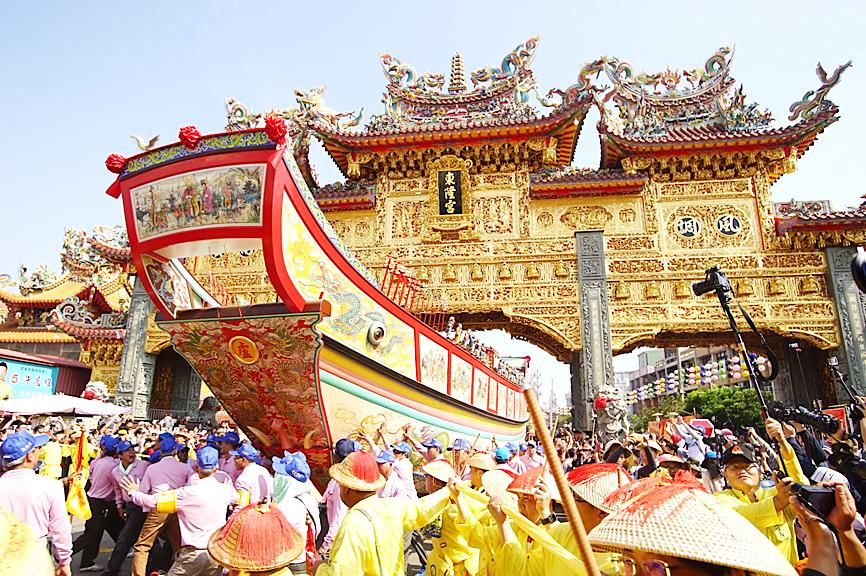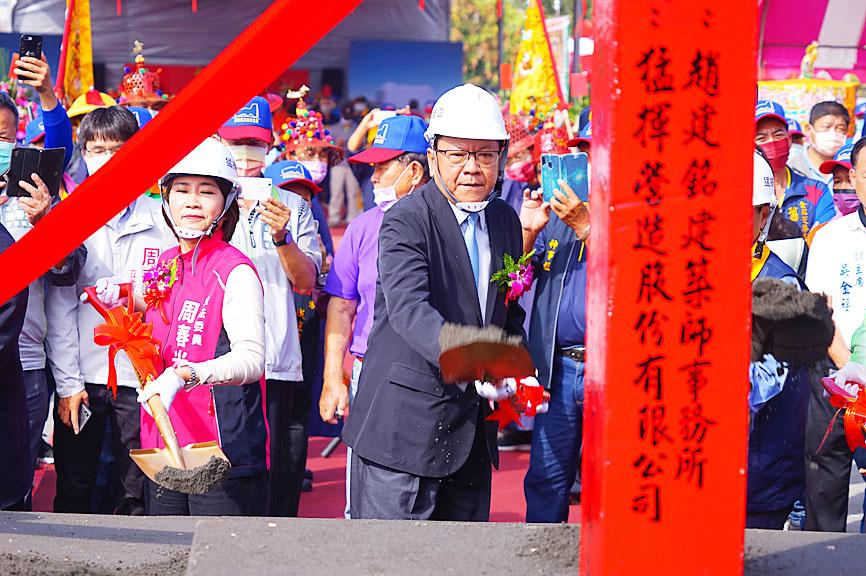The Pingtung County Government on Wednesday broke ground for a “king boat” cultural museum in Donggang Township (東港), which would be the first museum to tell the stories of the 300-year-old plague-expelling religious ritual involving specially built vessels.
The museum is scheduled to open in 2024.
At Wednesday’s ceremony, celestial lord Wang Ye was called upon to protect the new building.

Photo: Chen Yen-ting, Taipei Times
The museum, which would host a full-scale king boat, has been designed to enable visitors to appreciate the exquisite art of shipbuilding, Pingtung County Commissioner Pan Men-an (潘孟安) said.
The triennial Donggang King Boat Ceremony features a vessel built for Wang Ye, which is paraded through the town to expel and prevent the spread of plagues.
The event is the largest of its kind in Taiwan and dates back about 300 years. It was last held in October.

Photo: Chen Yen-ting, Taipei Times
King boats are adorned with detailed paintings of dragons and phoenixes, weaving together historical stories and figures from Chinese mythology.
At the end of Donggang’s week-long event, the king boat is taken to a local beach at midnight and set on fire to represent the casting out of plagues, as well as Wang Ye’s return to heaven.
The museum’s architectural design conveys the impression of a ship at sea, with an opening at the top symbolizing a dragon’s eye on a boat and curved lines at the building’s base representing waves, the Pingtung Cultural Affairs Department said in a statement.
The new museum would include an immersive theater to introduce visitors to the king boat culture through new technology, a 240-seat multifunctional audio-visual room, a library and classrooms, it said.

PRAISE: Japanese visitor Takashi Kubota said the Taiwanese temple architecture images showcased in the AI Art Gallery were the most impressive displays he saw Taiwan does not have an official pavilion at the World Expo in Osaka, Japan, because of its diplomatic predicament, but the government-backed Tech World pavilion is drawing interest with its unique recreations of works by Taiwanese artists. The pavilion features an artificial intelligence (AI)-based art gallery showcasing works of famous Taiwanese artists from the Japanese colonial period using innovative technologies. Among its main simulated displays are Eastern gouache paintings by Chen Chin (陳進), Lin Yu-shan (林玉山) and Kuo Hsueh-hu (郭雪湖), who were the three young Taiwanese painters selected for the East Asian Painting exhibition in 1927. Gouache is a water-based

A magnitude 4.1 earthquake struck eastern Taiwan's Hualien County at 2:23pm today, according to the Central Weather Administration (CWA). The epicenter of the temblor was 5.4 kilometers northeast of Hualien County Hall, at a depth of 34.9 km, according to the CWA. The earthquake's intensity, which gauges the actual effect of a temblor, was the highest in Hualien County, where it measured 2 on Taiwan's 7-tier intensity scale. The quake also measured an intensity of 1 in Yilan county, Taichung, Nantou County, Changhua County and Yunlin County, the CWA said. There were no immediate reports of damage or injuries.

OFF-TARGET: More than 30,000 participants were expected to take part in the Games next month, but only 6,550 foreign and 19,400 Taiwanese athletes have registered Taipei city councilors yesterday blasted the organizers of next month’s World Masters Games over sudden timetable and venue changes, which they said have caused thousands of participants to back out of the international sporting event, among other organizational issues. They also cited visa delays and political interference by China as reasons many foreign athletes are requesting refunds for the event, to be held from May 17 to 30. Jointly organized by the Taipei and New Taipei City governments, the games have been rocked by numerous controversies since preparations began in 2020. Taipei City Councilor Lin Yen-feng (林延鳳) said yesterday that new measures by

President William Lai (賴清德) has appointed former vice president Chen Chien-jen (陳建仁) to attend the late Pope Francis’ funeral at the Vatican City on Saturday on his behalf, the Ministry of Foreign Affairs said today. The Holy See announced Francis’ funeral would take place on Saturday at 10am in St Peter’s Square. The ministry expressed condolences over Francis’ passing and said that Chen would represent Taiwan at the funeral and offer condolences in person. Taiwan and the Vatican have a long-standing and close diplomatic relationship, the ministry said. Both sides agreed to have Chen represent Taiwan at the funeral, given his Catholic identity and